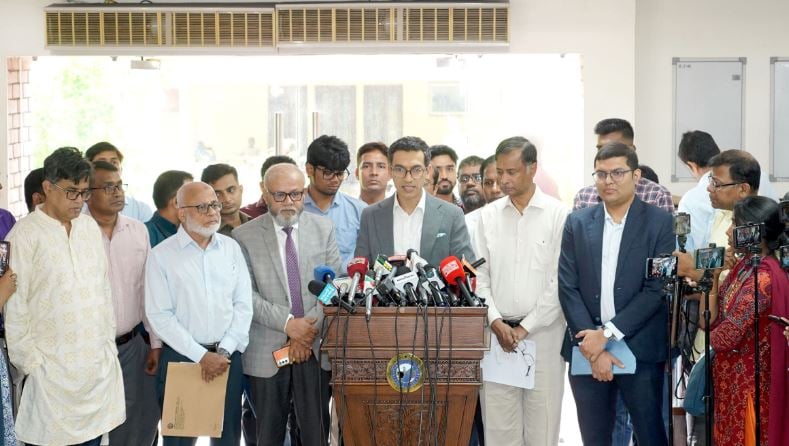News Flash

DHAKA, July 3, 2025 (BSS) - Executive Chairman of the Bangladesh Investment Development Authority (BIDA) Chowdhury Ashik Mahmud Bin Harun today said the National Semiconductor Taskforce, formed on January 1, 2025, under the guidance of the Chief Adviser’s Office, has identified a roadmap with three priority areas for the development of semiconductor industry.
The three priority areas are skills development, business environment & policy support and global linkages & collaborations.
“The taskforce assessed Bangladesh’s ability to compete in different stages of the semiconductor value chain (design, fabrication, testing and packaging) and recommended that the country prioritize chip design and testing and packaging in the short to medium term,” he said.
Ashik Chowdhury, also the convener of the taskforce, today made the comments at a press conference at the Foreign Service Academy in the city.
He said given the capital-and technology-intensive nature of fabrication, the taskforce advised that chip manufacturing be explored at a later stage, contingent on the progress made in the initial focus areas.
“The taskforce has outlined a set of targeted recommendations across three the key pillars: skills development, business environment and policy support, and global partnerships, with a phased roadmap covering the short, medium, and long term,” he added.
The taskforce, he said, recommended setting up industry-standard training labs, equipped with appropriate EDA tools in at least five selected public or private institutions by 2027.
They urged for establishing a rotation-based on-site training calendar for selected industry players and universities to facilitate training on the effective use of packaging and testing machines, he added.
The taskforce urged the government to conduct national-level outreach programmes, hackathons and innovation challenges for universities and startups to create buzz within the potential talent pool.
He said universities and training institutes can periodically adjust the certification and training modules to cater to specific evolving areas in the sector, e.g. processors, AI accelerator, signal processing.
Selected universities will provide MSc, PhD and postgraduate diplomas in semiconductor, he added.
To catalyze semiconductors as a priority sector in the country, Ashik Chowdhury said they recommended progressive tax exemptions for up to 10 years with certain guidelines for R&D and assembly and packaging factories in Bangladesh.
The taskforce also urged the authorities concerned to set-up a “semiconductor fund” under ICT or Bangladesh Bank, similar to the startup model, to provide venture capital support or term-financing to new initiatives against clear criteria.
Ashik Chowdhury, however, said semiconductor is a priority sector identified in the National Foreign Direct Investment (FDI) heatmap exercise conducted by BIDA and classified as a sector requiring policy and capacity support to unlock the long-term potential of the sector.
He said the semiconductor industry offers Bangladesh a unique opportunity to graduate into a high-value, high-growth sector and establish itself as a credible player in the global technology ecosystem.
“As an immediate priority, it is recommended that the country leverages its abundant engineering talent and NRB expertise to focus on chip design and testing stages. As global companies increasingly look to diversify the countries they source from, the recommendations above on the interventions required on skills development, policy support and global collaborations will position Bangladesh as a competitive and emerging player in the sector,” he added.
Head of Electrical and Electronic Engineering Department of Bangladesh University of Engineering and Technology (BUET) Prof. Dr. A. B. M. Harun-ur-Rashid and CEO of Ulks Mohammed Enayetur Rahman also spoke on the occasion.
Prof. Dr. A. B. M. Harun-Ur-Rashid said they recommended creating a virtual knowledge portal to launch a tiered certification (levels 1-3), with a globally accepted and industry-backed curriculum.
“A combination of online courses and in-person teaching will be disseminated through selected public and private universities. This will enable a faster supply of design engineers to the market on an immediate basis,” he added.
He laid emphasis on encouraging selected universities to offer advanced courses for students to pursue specializations; for example, in the senior year of bachelor’s programmes.
They suggested implementing complementary modules in targeted training institutes that can offer internationally accepted certificates, he added.
“For example, 12-week training modules on topics such as Register Transfer Level (RTL), Synthesis, Design for Testability (DFT) and Static Timing Analysis (STA).,” he mentioned.
The taskforce laid emphasis on strengthening faculty development and curriculum updates through international collaborations, exchange programs and leveraging the rich experience of NRB academics, he added.
BIDA Head of Business Development Nahian Rahman Rochi attended on the occasion.